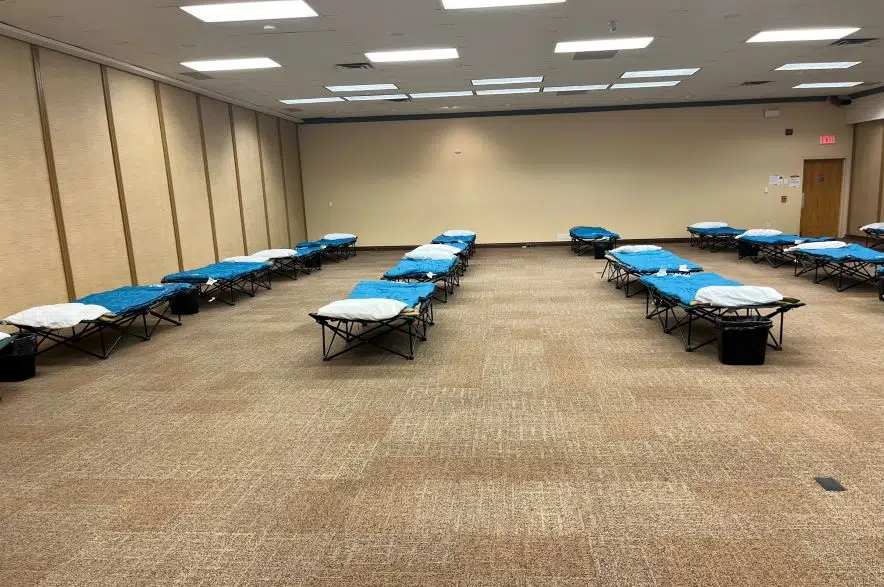Prairie Harm Reduction is not happy with the decision to start kicking the most troublesome clients out of Saskatoon’s Emergency Wellness Centre.
Mark Arcand is chief of the Saskatoon Tribal Council, which operates the 106-bed shelter in the Fairhaven neighbourhood. On Tuesday, Arcand said the wellness centre will begin handing out lengthy bans and turning away clients who are abusing drugs and ignoring the shelter’s rules. According to Arcand, his organization simply doesn’t have the resources to help them, and some staff members have expressed a fear to come to work.
“My initial reaction was just complete and utter disappointment,” said Kayla DeMong, executive director of Prairie Harm Reduction.
“The people who need the most help in our community are being restricted from services while we’re dealing with a massive crisis of homelessness in our community.”

Saskatoon Tribal Council’s Mark Arcand said the emergency wellness centre is going to be handing out lengthy bans and pushing people away if they abuse drugs and ignore shelter rules. (650 CKOM file photo)
Both the provincial and local governments were notified of the decision before yesterday’s announcement, but DeMong said the change caught her and her organization by surprise.
Now, DeMong said she’s scared about what the future will hold for her and her staff.
“I’m not going to lie, our staff are terrified about what this winter will hold for our community,” she stated.
“We’re already completely overrun in our facility with the people needing help. Over the last two years, it’s almost doubled in the number of people accessing services. We’re sitting close to 1,000 people a year who are needing supports from our facilities, and we just don’t have the resources to deal with it.”
DeMong noted that Prairie Harm Reduction’s supervised consumption site doesn’t get any provincial funding, while their drop-in centre is funded through small grants, which she said “barely hold the building together.”
She said the lack of attention to Saskatoon’s most vulnerable will not improve the homelessness issue in the city.
“We have hundreds of people in our city who will be sleeping in the cold this winter,” DeMong stated.
DeMong said she blames the Saskatchewan Income Support program for helping create this issue.
“The true cause of it all is the implementation of the (Saskatchewan Income Support) program through income assistance. It has resulted in an increased number of people who previously were able to access some shelter and some housing not being able to access it at all anymore,” DeMong said.
“We know that the living wage in our city just went up to $18.95 an hour – that’s how much it costs for per hour for a person to survive and meet their basic needs in our city – and income assistance is paying the equivalent of $9 an hour.”
NDP says more beds, treatment options are needed
Aleana Young, an MLA with the Saskatchewan NDP, said there’s not a simple answer for the addictions crisis the province is seeing.
Young said there is a need for more beds and more treatment options for those dealing with addiction.
“I don’t feel good walking down the street, seeing people sleeping in parks shaking on the ground from addiction and withdrawal,” she said.
“The park isn’t the right place for those people.”

NDP critic Aleana Young said there’s not a simple answer for the addiction crisis in Saskatchewan. (Mia Holowaychuk/650 CKOM)
These difficulties are present throughout the province, Young explained, adding that Saskatchewan’s limited treatment spaces come at a steep cost for communities.
“It’s costing lives. It’s costing money to local businesses,” she said.
Young said her own business in Regina had its window smashed out last year, and people broke into her business again only a couple months ago, though nothing was stolen.
“They didn’t even try (to) rob us,” she said. “It’s horrible what people are going through right now.”
Young said the provincial government needs to step up and play a role in addressing the crisis, and the responsibility shouldn’t fall solely on the cities, neighborhoods, or tribal councils that are “doing good work.”
— With files from 650 CKOM’s Mia Holowaychuk











